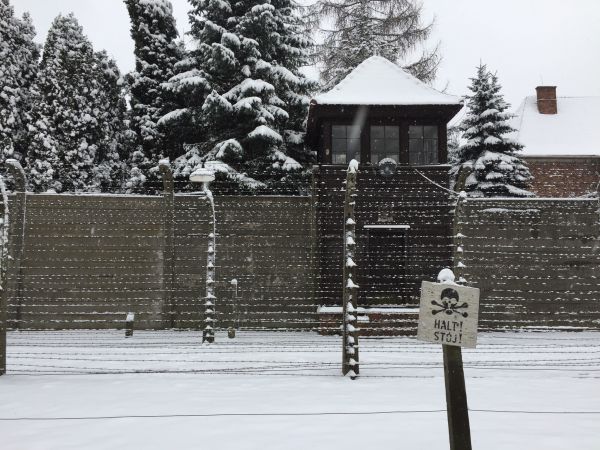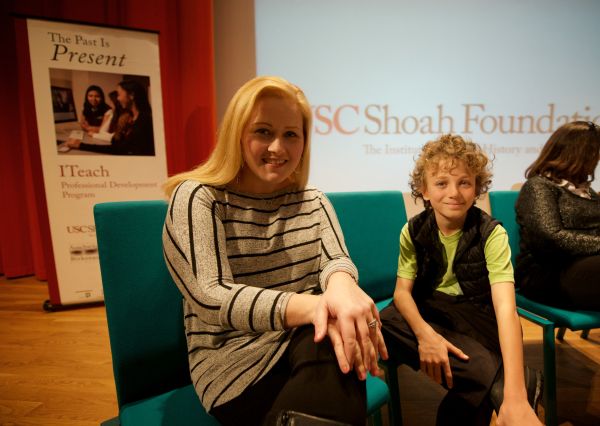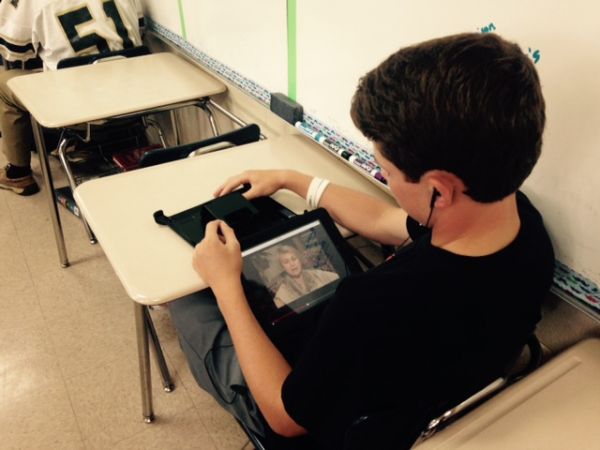Visiting Auschwitz: How it changed my teaching
As the first anniversary of my life-changing trip to Poland is upon me, I take time to reflect on the impact that trip has made on me both personally and professionally. I have learned so much from my experiences as a teacher in USC Shoah Foundation’s and Discovery Education’s Auschwitz: The Past is Present program.

People are interested. In all the stages of this journey, so many people have asked about my experiences. They are genuinely interested in learning more about this dark time in human history. I have had amazing opportunities to speak about my experience and my classroom use of IWitness. Whether my audience is a classroom full of teachers or a small room full of our “greatest generation,” the attentiveness of those in attendance and the challenging questions they ask demonstrate their sincere concern and regard to know more about the Holocaust. I don’t think a week has gone by when I haven’t had an opportunity to share my experiences from Auschwitz: The Past is Present.
My worldview has changed. My trip to Poland for the Auschwitz: The Past is Present program was my first trip to Europe. I had waited for a long time to “cross the pond,” and I am so thankful I was able to make the trip for such a significant event. Importantly, I came to realize exactly how “young” the United States is. As we toured the Museum of the History of the Polish Jews (POLIN), I was captivated by the long and rich history of the Jewish people in Poland. Our tour took us through hundreds and hundreds of years of Jewish life - through larger-than-life recreations, timelines, and state-of-the-art interactive exhibits.
Two days later, when we toured the city of Oswiecim, located near the Nazi death camp Auschwitz - quiet and snowy - a stark contrast to the modern POLIN, I was struck by how a once thriving Jewish community was, quite literally, annihilated. As we stood at the site Great Synagogue, destroyed by the Nazis decades ago, I could visualize a community full of life. That community was destroyed, and its long and abundant history faded into the snow. It saddened me to think that the name Oswiecim, is no longer synonymous with a thriving Jewish community; instead it is synonymous with atrocity. I think touring POLIN and then, almost immediately, touring Oswiecim really showed me an impact of the Holocaust that I had not strongly considered. Oswiecim is a little town much like my own. What would happen to our town if an entire group of people - maybe the Baptists or the Methodists or the Catholics - just vanished?

Students like learning through testimony. In this day-and-age where life moves quickly and “reality TV” is an ever-present part of life, the art of “storytelling” seems to have taken a back seat. Through IWitness, the age-old art of storytelling masterfully blends with the digital age. Students are captivated by listening to Holocaust survivors tell their own life stories. One of my favorite things about teaching with testimony is that students can learn more about a person than just their Holocaust experience; they learn about their childhood, their family, their fears, their dreams, their trials, their victories. Students learn about their humanity. I think that is a critical element for students to understand when they study genocide. Those affected are real people with real lives, and real stories to tell.
It’s not just about the numbers. As I worked my way through the testimonies and activities in IWitness, I realized something I hadn’t really considered before. It’s not just about the numbers. It’s about the individuals. Yes, saying “six million Jews died during the Holocaust” sounds shocking, but I don’t really know what six million is. I’ve never consciously had six million of anything. However, learning about Roman Kent’s dog Lala, or Paula Lebovics’s narrow escape from a guard, or Erna Anolik’s story of hiding after an escape have shown me the reality of the Holocaust. Yes, the numbers are astounding, but the effect on the lives of individual human beings is harrowing. Through testimony, students come to realize that learning about the Holocaust isn’t just about an intangible number; it’s about the stories of those who lived to tell.

I am so very grateful to have been part of the 70th Anniversary of the liberation of Auschwitz. This increidble experience in Poland of meeting survivors and then listening to testimony, has changed me not only as an educator, but as a person. I know I will be using the resources from Discovery Education and IWitness for years to come!